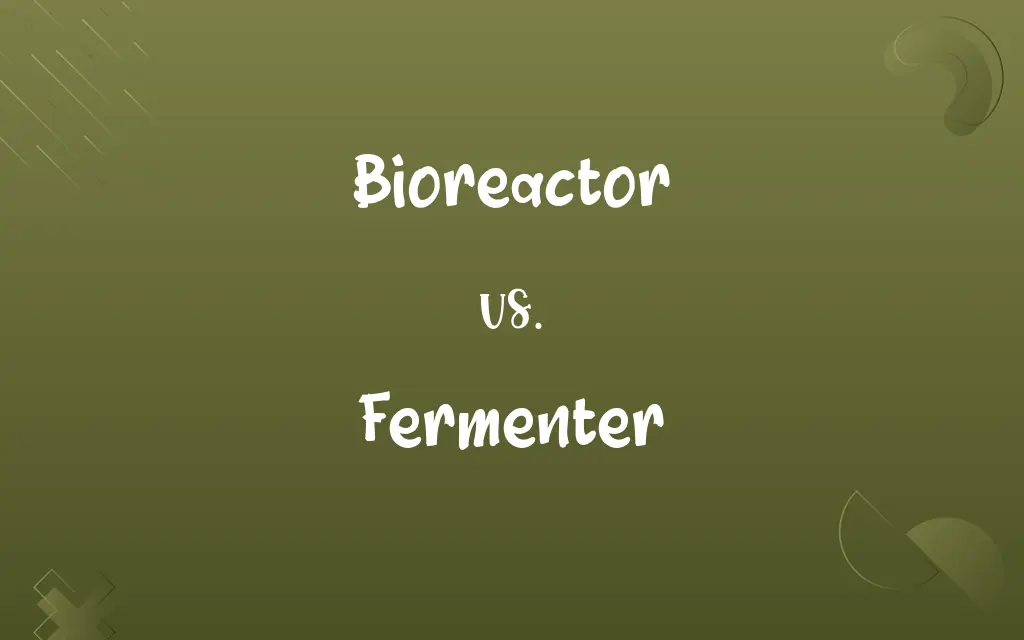Bioreactor vs. Fermenter: Know the Difference

By Shumaila Saeed || Published on January 31, 2024
A bioreactor is a device for growing organisms under controlled conditions, while a fermenter specifically facilitates fermentation, often for brewing or biochemical production.

Key Differences
Bioreactors are used for a variety of bioprocesses, including tissue engineering and cell cultures. Fermenters are primarily used for fermentation processes, like brewing beer and producing yogurt.
Shumaila Saeed
Jan 31, 2024
Bioreactors support a wide range of biotechnological applications beyond fermentation. Fermenters are designed specifically for anaerobic or aerobic fermentation processes.
Shumaila Saeed
Jan 31, 2024
Bioreactors are designed to provide precise control over environmental conditions, including pH, temperature, and oxygen levels. Fermenters, while also controlled, are typically focused on optimizing conditions for fermentation.
Shumaila Saeed
Jan 31, 2024
Bioreactors can be used for both research and industrial-scale production. Fermenters are often associated with industrial-scale brewing and production of fermented products.
Shumaila Saeed
Jan 31, 2024
Bioreactors tend to be more technologically advanced, catering to a broader range of biological processes. Fermenters, though advanced in their own right, are more specialized for fermentation.
Shumaila Saeed
Jan 31, 2024
ADVERTISEMENT
Comparison Chart
Primary Use
Broad range of bioprocesses.
Specifically for fermentation processes.
Shumaila Saeed
Jan 31, 2024
Control Parameters
Controls pH, temperature, oxygen, etc.
Focuses on optimal fermentation conditions.
Shumaila Saeed
Jan 31, 2024
Application Scope
Research and industrial scale.
Mainly industrial scale, especially brewing.
Shumaila Saeed
Jan 31, 2024
Process Diversity
Supports various biotechnological applications.
Primarily anaerobic and aerobic fermentation.
Shumaila Saeed
Jan 31, 2024
Technological Features
Often more complex due to versatility.
Specialized for efficient fermentation.
Shumaila Saeed
Jan 31, 2024
ADVERTISEMENT
Bioreactor and Fermenter Definitions
Bioreactor
A bioreactor is a container used for biologically active environments.
The lab used a bioreactor to grow stem cells.
Shumaila Saeed
Jan 11, 2024
Fermenter
A fermenter is a vessel used for microbial fermentation processes.
The brewery used a large fermenter for beer production.
Shumaila Saeed
Jan 11, 2024
Bioreactor
Bioreactors are used for cultivating organisms for bio-product synthesis.
Algae biofuel is produced in large-scale bioreactors.
Shumaila Saeed
Jan 11, 2024
Fermenter
Fermenters are used in the production of fermented foods and beverages.
Traditional kimchi is made in small-scale fermenters.
Shumaila Saeed
Jan 11, 2024
Bioreactor
Bioreactors are utilized in tissue engineering and regenerative medicine.
Artificial organs are developed in specialized bioreactors.
Shumaila Saeed
Jan 11, 2024
ADVERTISEMENT
Fermenter
Fermenters facilitate the growth of microorganisms in an anaerobic environment.
Yogurt is produced in fermenters under controlled conditions.
Shumaila Saeed
Jan 11, 2024
Bioreactor
Bioreactors provide controlled conditions for biochemical processes.
The bioreactor maintained optimal conditions for enzyme production.
Shumaila Saeed
Jan 11, 2024
Fermenter
Fermenters can also be used in pharmaceuticals for producing antibiotics.
Antibiotics like penicillin are produced in specialized fermenters.
Shumaila Saeed
Jan 11, 2024
Bioreactor
Bioreactors can be used for waste treatment and bioremediation.
Wastewater treatment plants often use bioreactors for microbial digestion.
Shumaila Saeed
Jan 11, 2024
Fermenter
Fermenters optimize conditions for ethanol or lactic acid production.
Industrial fermenters are used for large-scale ethanol production.
Shumaila Saeed
Jan 11, 2024
Bioreactor
An apparatus, such as a fermentation chamber, for growing organisms such as bacteria or yeast that are used in the biotechnological production of substances such as pharmaceuticals, antibodies, or vaccines, or for the bioconversion of organic waste.
Shumaila Saeed
Jan 11, 2024
Bioreactor
(biochemistry) A fermentation vat, containing microorganisms or biochemically active substances, used for waste recycling or for making drugs.
Shumaila Saeed
Jan 11, 2024
Fermenter
Also fer·men·tor An apparatus that maintains optimal conditions for the growth of microorganisms, used in large-scale fermentation and in the commercial production of antibiotics and hormones.
Shumaila Saeed
Jan 11, 2024
Bioreactor
An apparatus in which a suspension of microorganisms in a liquid are used to perform chemical reactions, as in synthesis of pharmaceutical agents or the conversion of harmful waste to less harmful substances. The reactor consists of a vessel to contain the suspension of microorganisms, plus a variety of attached devices used to control the reaction.
Shumaila Saeed
Jan 11, 2024
Fermenter
An apparatus for carrying out fermentation by a liquid suspension of microorganisms; a fermentation tank; as, an industrial fermenter.
Shumaila Saeed
Jan 11, 2024
Repeatedly Asked Queries
How do bioreactors control environmental conditions?
Bioreactors control conditions like pH, temperature, and oxygen levels to optimize growth and production.
Shumaila Saeed
Jan 31, 2024
Is a fermenter only used for anaerobic processes?
While commonly used for anaerobic processes, fermenters can also support aerobic fermentation.
Shumaila Saeed
Jan 31, 2024
Can fermenters be used for waste treatment?
While less common, fermenters can be adapted for waste treatment, particularly in the production of biogas.
Shumaila Saeed
Jan 31, 2024
What scale are bioreactors typically used on?
Bioreactors are used on both research and industrial scales.
Shumaila Saeed
Jan 31, 2024
Are fermenters used in food production?
Yes, fermenters are widely used in producing fermented foods and beverages like yogurt, beer, and kimchi.
Shumaila Saeed
Jan 31, 2024
What is the main function of a fermenter?
The main function of a fermenter is to facilitate fermentation, often for brewing or biochemical production.
Shumaila Saeed
Jan 31, 2024
Can bioreactors grow plant cells?
Yes, bioreactors are capable of growing plant cells for various applications.
Shumaila Saeed
Jan 31, 2024
What is a bioreactor used for?
Bioreactors are used for a wide range of bioprocesses including cell culture, tissue engineering, and bioremediation.
Shumaila Saeed
Jan 31, 2024
What types of bioreactors are there?
There are several types, including stirred-tank, airlift, and fluidized bed bioreactors.
Shumaila Saeed
Jan 31, 2024
Do fermenters produce biofuels?
Yes, fermenters are used in the production of biofuels like ethanol.
Shumaila Saeed
Jan 31, 2024
Are fermenters used in the dairy industry?
Yes, fermenters are widely used in the dairy industry, particularly for yogurt and cheese production.
Shumaila Saeed
Jan 31, 2024
How do bioreactors contribute to environmental sustainability?
Bioreactors are used in bioremediation and waste treatment, contributing to environmental sustainability.
Shumaila Saeed
Jan 31, 2024
Can bioreactors be used for pharmaceutical production?
Yes, bioreactors are often used in the pharmaceutical industry for producing drugs and vaccines.
Shumaila Saeed
Jan 31, 2024
Do bioreactors require sterilization?
Yes, bioreactors need to be sterilized to prevent contamination and ensure controlled growth conditions.
Shumaila Saeed
Jan 31, 2024
Are bioreactors used in stem cell research?
Yes, bioreactors play a crucial role in stem cell cultivation and research.
Shumaila Saeed
Jan 31, 2024
What is the capacity range of fermenters?
Fermenters can range from small laboratory-scale to large industrial-scale vessels.
Shumaila Saeed
Jan 31, 2024
How do fermenters differ in brewing and pharmaceuticals?
While the basic principle is the same, fermenters in brewing and pharmaceuticals may vary in design and control systems based on the product.
Shumaila Saeed
Jan 31, 2024
What materials are bioreactors made of?
Bioreactors are typically made of stainless steel or glass, depending on the scale and application.
Shumaila Saeed
Jan 31, 2024
Can fermenters be automated?
Yes, modern fermenters often incorporate automation for precise control and monitoring.
Shumaila Saeed
Jan 31, 2024
Is oxygen control important in fermenters?
Oxygen control is crucial in aerobic fermenters to optimize microbial growth and product formation.
Shumaila Saeed
Jan 31, 2024
Share this page
Link for your blog / website
HTML
Link to share via messenger
About Author
Written by
Shumaila SaeedShumaila Saeed, an expert content creator with 6 years of experience, specializes in distilling complex topics into easily digestible comparisons, shining a light on the nuances that both inform and educate readers with clarity and accuracy.






































































